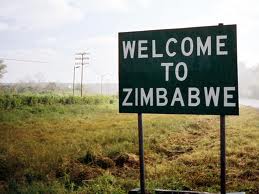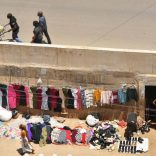Rwanda-backed rebels in Congo executed civilians, Human Rights Watch says
Zim’s energetic traffic cops hunt dollars

File photo
Zimbabwe’s energetic traffic police might fine you for your factory-issued spare wheel and for not having your fire extinguisher in the cab but there’s one thing they can’t nab you for: carrying more than 200 US dollars.
A photo of a 2008 government notice that said it was illegal to be in possession of more than $200 in cash has provoked panic on WhatsApp during the last few days, made worse by Zimbabwe’s current cash shortages.
The likelihood of some people having more than this amount on them is high. After all, foreign travellers have been advised to carry all the cash they need for their trip on them.
Locals have also been trying to drain their bank accounts in anticipation of the introduction in October of ‘bond notes’, a local equivalent to US dollars that many fear will herald a return to hyperinflation and the dark days of food and fuel shortages.
Now a police spokesperson has said claims the police enforced the ‘no-more-than-200-US-per-person’ were false, according to the official Herald newspaper.
Plastic money
Charity Charamba told the newspaper, “No one is allowed to search any household or vehicle on the strength of this false WhatsApp message which is in part related to a Statutory Instrument that was in force during the Zimbabwe dollar era.
“The Zimbabwe Republic Police would like to warn perpetrators of falsehoods that the long arm of the law will catch up with them,” Charamba added.
News24 has been unable to verify a widely-circulated WhatsApp claim a young driver had $200 confiscated from her after she was found with $400 in her purse.
The Zimbabwe central bank is trying to force businesses, parastatals, schools and even informal traders to use plastic money. Point-of-sale systems are available in some big supermarkets but are often offline, carry expensive bank charges and are useless to the vast majority of workers who are employed in the informal sector.
News that police have no right to confiscate cash above a $200 threshold should offer some relief to Zimbabweans and travellers.
But those unfamiliar with Zimbabwe’s road system should be aware that police operate a dense system of roadblocks and could fine unsuspecting drivers for a litany of offences. Five roadblocks along a 15km stretch of road (or four in a 12km stretch) are not unusual.
Among the offences drivers have complained of being fined for are the ‘biscuit’ (solid) spare wheel found in the back of Japanese cars legally brought into Zimbabwe; not having red reflective tape on both sides of their warning triangles; having different makes of tyre fitted on their vehicle; having their fire extinguisher in the boot rather than in the cab, and not displaying their reflective vests in their cars.
Spot fines
Fines range from $5 to $20. Motorists should be aware that police may not impose a roadside fine (known locally as a “spot fine”) of more than $20. But it does seem possible to be fined for more than one offence at a time.
Although drivers were supposed to have the option of paying later at a police station, many police officers would not agree to this. If you do not have the required cash on you, officers were likely to demand that you take them with you when you draw out the money from an ATM. They could also threaten to impound your vehicle.
Charamba defended the number of roadblocks on Zimbabwe’s roads, telling this weekend’s Sunday Mail, “At times roadblocks are mounted for security reasons, crime detection, prevention and investigations.”
Among Zimbabwe’s motoring public, the received wisdom is to carry a dedicated ‘road fine fund’ in your glove compartment and to keep the number of the police general headquarters complaints desk in your car so that you can call from a roadblock if you feel you are being unfairly treated.













Leave a Reply
Be the First to Comment!
You must be logged in to post a comment.
You must be logged in to post a comment.